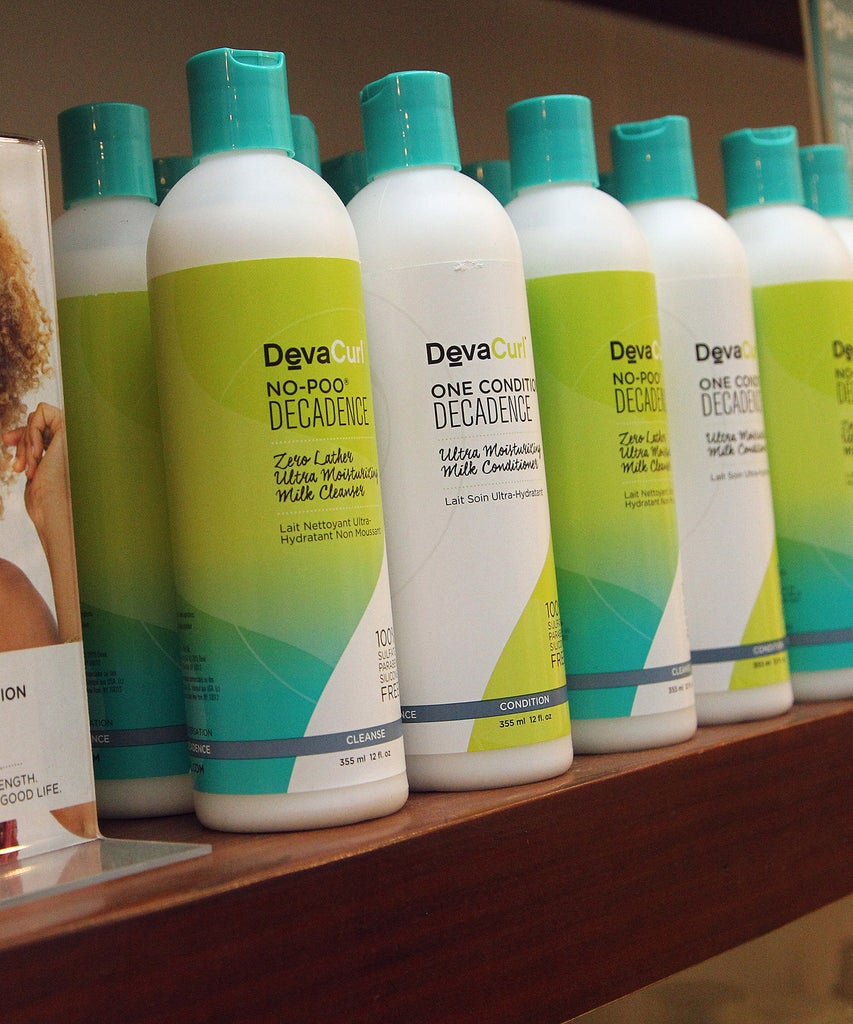
Last month, beauty YouTuber Ayesha Malik released a video advising her 203,000 subscribers not to buy products from curly hair-care brand DevaCurl. Malik, who previously worked with the brand as an ambassador, begins the video with a warning: “If you’re currently using these products, stop immediately.”
In the video, titled “Why I Stopped Using DevaCurl,” the vlogger goes on to claim that the products, which she used for six years, allegedly caused dandruff, hair loss, and changes to her curl pattern — and that she’d received messages from women claiming to have experienced similar side effects after they started using DevaCurl at her recommendation. Now, the brand is responding to the backlash, starting with a statement on its website.
In the statement, the brand claims that it completed additional testing for its products and found no safety issues with the existing formulas — but are committed to investigating the recent claims. “We don’t speculate on why some people are attributing the challenges with their curls to our products,” the statement reads. “As part of our ongoing commitment to product safety and the satisfaction of our Deva Community, we are conducting additional testing with an independent party.”
The rumors have led followers to question other influencers who have previously praised the hair brand on social media, including India Batson, a fellow curly-hair YouTuber who addressed the controversy this week in a video titled “Dear DevaCurl.” “I feel like I can’t be silent on this when I see how many people it’s affecting,” she said. While Batson said she didn’t personally experience any adverse side effects from using the brand’s products, she still urged viewers to stop using them. She continued, “I have personally decided to not use their products at this point in time, and I would recommend, as a friend, to stop using them as well until we get to the bottom of this.”
At this point, the concern has grown beyond YouTube: In January, a law firm posted an advertisement looking for clients to participate in a class-action investigation into the reports of alleged hair loss and damage after using DevaCurl products. What’s more, there’s a private Facebook support group with over 23k followers run by Florida hairstylist Stephanie Mero, who describes it as a “group for people who believe they are suffering hair and scalp issues from using DevaCurl products.”
While DevaCurl continues to conduct testing to get to the bottom of the issue, we asked Dr. Dominic Burg, chief scientist, biologist, and trichologist for Évolis Professional, to weigh in on the issue. While Dr. Burg says that some products can cause dandruff and dryness, it’s unlikely that a styling or shampoo formula would actually change a hair pattern completely. “The curl pattern is mainly defined by the shape of the hair shafts and the angle that they grow out of the head,” Dr. Burg says. “Changing the curl of hair is usually only seen after severe trauma to an area of scalp or after chemotherapy. If the hair has become drier, is damaged, or if there is electrostatic repulsion of the hair via surface charging caused by some chemicals, then the individual shafts may not sit well together, changing the quality of the curls rather than the actual pattern.”
He also adds that the ingredients found in the No-Poo line from DevaCurl — which are the products facing the most controversy — are quite common and wouldn’t necessarily cause hair loss, though the ingredient diazolidinyl urea can cause sensitivity for some people.
Many have compared this controversy to the 2015 lawsuit against hair-care brand Wen that was settled out of court and involved complaints from customers who claimed they were experiencing significant hair loss and scalp irritation after using the brand’s “no-poo” formula. While it never went to court, the plaintiff’s attorney Amy Davis gave a statement to CBS Los Angeles in 2016, saying, “From what we understand about the product and how it causes hair loss is it contains virtually no cleanser. It’s like using lotion to wash your hair. So instead of removing the product when you rinse it off, it just becomes impacted in your hair follicle.”
As DevaCurl investigates the issue, it’s important to remember that product results can be subjective — and hair loss and scalp problems can be caused by allergies, stress, hormones, or other underlying health issues. That’s why it’s important to monitor your reaction to products and seek professional help if you experience any negative side effects. DevaCurl is also encouraging users to email [email protected] to report their experiences with the product.
This is a developing story and we will update it as we learn more.
Like what you see? How about some more R29 goodness, right here?






